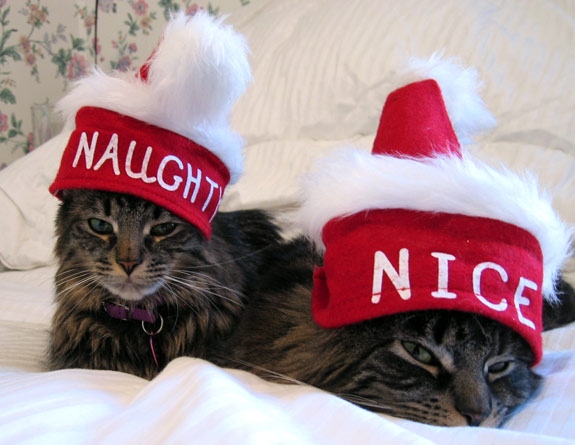Good Tidings
Frosted windowpanes, candles gleaming inside, painted candy canes on the tree… The holidays are a time to eat, decorate and celebrate. However remember those same treats and trimmings can be potentially dangerous to our pets.
Sweets and chocolates can be poisonous. Chocolate contains theobromine –a potent cardiac stimulant. The highest doses of theobromine are found in unsweetened baking chocolate. Fortunately, milk chocolate has been “diluted” with sugars, creams and milk and contains much less theobromine. Milk chocolate ingestion can result in vomiting and diarrhea; it usually does not cause toxicosis unless a large amount is ingested. However, seizures and a dangerously elevated heart rate can easily occur when a 10 lb dog or cat ingests as little as ¼ ounce of baking chocolate. Xylitol containing sugar free chewing gum and candy can be hazardous. Xylitol ingestion can result in a sudden drop in blood sugar, resulting in depression, loss of coordination and seizures. There may also be a link between xylitol ingestion and liver failure. There was a 140 % increase in reports of xylitol poisoning from 2004 to 2005 at the Animal Poison Control Center.
Uncooked, yeast dough can cause alcohol poisoning in your pet. Alcohol is a breakdown byproduct of yeast and sugar fermentation. Rising dough can also bloat in your pet’s stomach causing severe abdominal pain. Many cases will require surgical removal of the dough and hospitalized supportive care.
Grapes and raisins when ingested can cause kidney failure in certain animals. Veterinarians don’t yet understand the causative agent or the exact mechanism of the kidney injury nor the exact amount ingested needed to result in kidney damage. Not all animals that ingest grapes or raisins become affected, but it is better to be safe than sorry. Take grapes and raisins off of your pet’s menu.
Holiday leftovers are often fatty, rich foods that can cause vomiting, diarrhea and lead to inflammation of the pancreas. Pancreatitis is a serious disease that usually requires extensive hospitalization. Never feed your pet left over bones. Bones can lodge in the roof of the mouth, esophagus, stomach and the intestinal tract. Smaller poultry bones can splinter and lacerate the gastrointestinal mucosa similar to glass shards.
Mistletoe and Holly berries are especially dangerous plants. Be sure to keep these out of reach of pets and children. Don’t forget that your cat can be a sneaky climber and reach unthinkable heights when drawn to a new plant. Use artificial substitutes of both of these instead. Contrary to popular belief, poinsettias are not toxic. Their leaves and branches can be very irritating to mucous membranes and thus may cause excessive salivation and vomiting but not toxicosis. Christmas tree tinsel, ornaments and needles can pose choking hazards. Ribbon and tinsel can cut the intestines and cause the loops to accordion onto themselves resulting in emergency surgery. Consider anchoring the Christmas tree to prevent curious cats from toppling the tree as they climb to the top. Remember most pets will help themselves to the Christmas tree water so don’t use additives or preservatives in the water.



